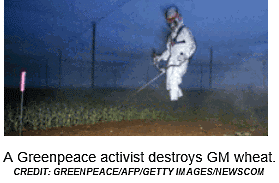|
|
|
|
|
|
|
News & Views item - July 2011 |
![]() A Not So Peaceful Act. (July 22, 2011)
A Not So Peaceful Act. (July 22, 2011)
Greenpeace has claimed responsibility for the July 14th vandalising of an experimental plot of transgenic wheat in what appears to be a counterproductive approach in publicising its viewpoint on research involving possible beneficial transgenic modification of foodstuff in a search for improved food security.
This is how Science reported the incident:
 Just
after midnight on 14 July, three activists wielding motorized grass trimmers
broke into an agricultural test plot operated by CSIRO, Australia's preeminent
research organization. They damaged hundreds of genetically modified (GM) wheat
plants.
Just
after midnight on 14 July, three activists wielding motorized grass trimmers
broke into an agricultural test plot operated by CSIRO, Australia's preeminent
research organization. They damaged hundreds of genetically modified (GM) wheat
plants.
Greenpeace claimed responsibility. In a news release, the organization states
that the vandalism “follows the revelation” that CSIRO “is conducting the
world's first human feeding trials of GM wheat, without adequate safety
testing.”
The vandalism caught CSIRO off-guard. “This may have cost us a year of research and several hundred thousand dollars,” says CSIRO Plant Industry Chief Jeremy Burdon. The activists damaged GM wheat plants that CSIRO has been developing over the past 13 years with the Australian Grains Research and Development Corp. and the French company Limagrain. One variety boosts yields; another more efficiently metabolizes nitrogen; a third triples levels of amylose, a starch that doesn't spike blood sugar levels.
Two years ago, the Office of the Gene Technology Regulator granted CSIRO permission to test the high amylose wheat in a short-term trial in a small number of volunteers. An ethics committee approved the trial in 2010. If the experiment goes ahead, it would indeed be the world's first human trial of GM wheat, says Bruce Lee, director of CSIRO Food Futures Flagship.